Council Passes aPodment Rules
The city council unanimously adopted legislation this afternoon setting up new regulations governing microhousing, AKA aPodments, after some two years spent agonizing and debating how, and whether, the tiny apartments should be allowed to exist.
The city council became interested in regulating the small studio apartments after neighborhood activists complained, back in 2013, that their developers were exploiting a loophole in land-use law that allowed each floor of a building to count as a single "unit" for design-review and permitting purposes, even if that floor included as many as eight individual living spaces.

Later, council members—headed up by Planning, Land Use, and Sustainability Committee chair Mike O'Brien—proposed restrictions that went far beyond requiring each living space to count as an individual unit. The legislation will also require multiple sinks, set a minimum apartment size (220 square feet, as opposed to the previously proposed 220-square-foot average), a mandate for minimum parking standards, and an increase in the size of common areas, among other regulations. Microhousing proponents argued that the proposed new rules would make it more difficult, and more expensive, to build the relatively affordable units.
After today's vote, developer lobbyist Roger Valdez said: "This vote gives the council the best of both worlds; they can claim to have simply regulated microhousing publicly, but know that neighbors are cheering because they've, in truth, outlawed the product. The council again today has demonstrated a 'fingers in their ears' approach to housing. Hear the facts about how their actions will actually boost rents, but take the action anyway. One more step down the road to becoming San Francisco."
Opponents said the rules served as a bulwark against excessive new density near historically single-family neighborhoods.
"This bill, I'll be clear, is a compromise," O'Brien, who headed up a task force of stakeholder earlier this year, said this afternoon. "It creates a path for these affordable units to continu to be developed."
Mayor Ed Murray, who previously intimated that he might veto the new, more restrictive legislation, issued the following statement in response to the council's vote this afternoon: “I continue to have concerns about the potential impacts that the amended legislation approved by Council today will have on the affordability of micro-housing in this city.
“With the recent formation of the Housing Affordability and Livability Advisory Committee, we are about to open up a much broader conversation about housing affordability, and we will be looking at all tools in the toolbox to promote more affordable housing options for all.
“I remain open to revisiting the issue of micro-housing within the context of this broader affordability discussion if that’s a direction the Advisory Committee decides to go.”
Council member Tom Rasmussen told PubliCola that given today's unanimous vote, "I'm not sure that we want to spend any more time on [microhousing] moving forward."
Asked specifically why the mayor didn't veto it (despite the 9-0 approval, he could have used a veto to put the legislation on hold while trying to engage the council through his task force discussions), Murray spokesman Jason Kelly told us that, bottom line, the mayor wanted there to be basic regulations and also, in incrementalist Murray mode, noted that Murray's task force discussions could end up tweaking the rules.
Kelly said:
There are important provisions in the ordinance that put in place a regulatory framework to govern the development of micro-housing. The mayor was concerned about the lack of appropriate oversight, a major motivation behind him sending down his legislation earlier in the year.
The advisory group is just launching its more comprehensive conversation about housing affordability in Seattle. Councilmembers will be actively engaged in framing and informing that discussion.




